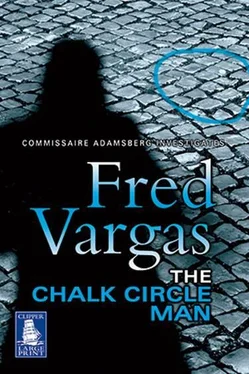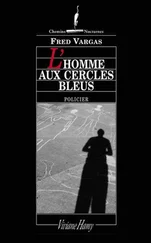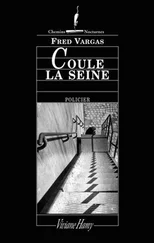Back at the station, Adamsberg found Danglard quite far gone. He had acquired some companions to help him start on the afternoon’s bottle of white wine earlier than usual. Sitting round his desk, as if round a café table, Mathilde Forestier and the handsome blind man were knocking the wine back merrily in plastic cups. Things were getting noisy.
Mathilde’s resonant voice rang out above the din, and Reyer kept his face turned towards the Queen, looking happy. Adamsberg mentally noted once more the blind man’s prodigiously beautiful profile, but it annoyed him to see Reyer keeping his eyes firmly fixed on Mathilde, if that was the right expression. And why in the world should that annoy him? Was it because he sensed that the blind man was going to be snapped up by Mathilde? No. Mathilde was no ordinary woman, and she would lay no nasty traps in which the weaker party is devoured. But at the same time, when someone laid a hand on Mathilde it was difficult just now not to see a hand being laid on Camille. No, he mustn’t confuse them. And anyone had the right to touch Camille, this was a salutary principle he had long ago established. But perhaps it was that Danglard too seemed on the point of being drawn in, despite having been so categorically opposed to Mathilde. It looked as if the two men were engaged in some kind of contest as they sat around the table; the scene smacked of tried and tested seduction gambits, and it had to be admitted that Mathilde, being by now well launched into the white wine, was not insensitive to the atmosphere. After all, she had a perfect right. And Danglard and Reyer too had a perfect right to act like teenagers if they felt like it. What was coming over him, pushing him to act the censor and dictate rules of conduct? Had his own conduct been above reproach toward the young woman in the flat downstairs, with whom he had spent the night? No, not at all. Although a little taken back by the opportunity when it had presented itself, he had chosen his words carefully and had applied his own rules meticulously throughout. But had his conduct towards Christiane been above reproach? Absolutely not; much worse. That reminded him that he hadn’t remembered to think about her. So he might as well have a drink with the others. And ask himself what the hell they were doing there anyway.
When he looked more closely, Danglard was not as carried away as all that by the charms of the two suspects sitting at his table. And if one looked more closely again, Danglard the thinker was watching, observing, listening and provoking, however drunk he might appear. Even in his cups, for Danglard’s incisive brain Mathilde and Reyer remained a couple of people rather too closely mixed up in a murder case. Adamsberg smiled and went over to the table.
‘I know,’ said Danglard, indicating the wine, ‘it’s against the rules. But these persons are not here to see me officially. They’re just passing through. It was you they wanted to see.’
‘And how!’ said Mathilde.
From Mathilde’s face, Adamsberg could tell that she was furious with him. Better avoid a row in front of everyone. He gave up on the idea of a drink and took them into his office, making a conciliatory sign to Danglard. But Danglard couldn’t have cared less – he had already returned to his paperwork.
‘So. It seems that Clémence didn’t hold her tongue?’ Adamsberg inquired gently of Mathilde as he sat sideways at his desk.
‘Why should she?’ said Mathilde. ‘Apparently you badgered her with a whole lot of questions about her own life and then about Réal. Adamsberg, for heaven’s sake, what kind of behaviour is that?’
‘Police behaviour, I suppose,’ said Adamsberg. ‘But I didn’t badger her. Clémence has plenty to say for herself unaided, even if she whistles through her teeth. And I wanted to meet Réal Louvenel. I’ve just got back from seeing him.’
‘I know!’ said Mathilde. ‘And that really makes me see red!’
‘That’s perfectly normal,’ said Adamsberg.
‘What did you want to see him for?’
‘ To find out what you said at the Dodin Bouffant .’
‘For God’s sake, what’s so important about that?’
‘Sometimes, but only sometimes, I’m tempted to find out what people are concealing from me. And according to that article in the 5th arrondissement newsletter, you’ve been acting like a flytrap for anyone who wants to get close to the chalk circle man. So I have to take an interest. I think you have a pretty good idea who he is. I had hoped you would have said a bit more that evening, and that Louvenel would have told me about it.’
‘I never imagined you’d go in for such underhand dealings.’
Adamsberg shrugged.
‘What about you, Madame Forestier? The first time you came into the police station. Was that straightforward dealing?’
‘I had no choice,’ said Mathilde. ‘But you’re supposed to be an honest man. And all of a sudden you’ve turned slippery.’
‘I’ve got no choice, either. Anyway, that’s how I am, I’m slippery. I have to change all the time.’
Adamsberg rested his chin on his hand, still facing sideways. Mathilde was watching him.
‘It’s as I said,’ Mathilde continued. ‘You’re amoral – you should have been a prostitute.’
‘Just what I am being, in order to get information.’
‘About what?’
‘About him. The chalk circle man.’
‘Well, you’re going to be disappointed. I made it all up about the identity of the circle man, based on a few vague memories. I’ve got no proof of any of it. Pure invention.’
‘Little by little,’ murmured Adamsberg, ‘I’m managing to extract a few fragments of the truth. But it takes a long time. Would you be able to tell me who he is? Even if you’re making it up, it still interests me.’
‘It’s not based on anything serious. Only the circle man reminds me of someone I used to follow some years ago, over by Pigalle too, as it happens. I used to follow this particular man to a dark little restaurant where he lunched alone. He worked while he was eating, and never took his raincoat off. He covered his table with piles of books and papers. And when he dropped something, which happened all the time, he would lift up the hem of his raincoat as if it was a bridal train, whenever he bent down to pick it up. Sometimes his wife would come along, with her lover, to have coffee with him. Then he looked pathetic, desperate to accept any humiliation in order to hang on to whatever was left. But when the wife and her lover had gone, he would be seized with rage, he’d stab at the paper tablecloth with his knife and obviously he was pretty upset. In his place I would have had a drink, but he seemed not to touch alcohol. I noted in my book at the time “Little man greedy for power but doesn’t have it. How will he get out of this?” See, I tend to make snap judgements. Réal tells me that too: “Mathilde, you make too many snap judgements.” Then I stopped bothering with this man, he made me feel sad and edgy. I follow people to do myself good, not to go poking about in their misery. But when I saw the circle man, and his habit of holding the hem of his coat when he bent down, it reminded me of someone. I looked through my notebooks and remembered the little man who was greedy for power but had none at all, and I thought “Well, why not? Is this perhaps the way he’s found to exercise some kind of power?” Another snap judgement, and that’s where I left it. You see, Adamsberg, you’re disappointed, aren’t you? It wasn’t worth making all those underhand visits to my place and Réal’s to get this kind of pointless information.’
But Mathilde’s anger had subsided.
‘Why didn’t you tell me all this in the first place?’ Adamsberg asked her.
Читать дальше












